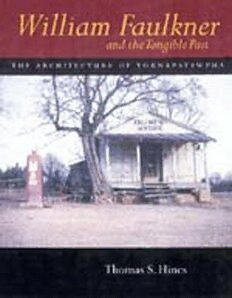Download William Faulkner and the Tangible Past: The Architecture of Yoknapatawpha PDF Free - Full Version
Download William Faulkner and the Tangible Past: The Architecture of Yoknapatawpha by Thomas S. Hines in PDF format completely FREE. No registration required, no payment needed. Get instant access to this valuable resource on PDFdrive.to!
About William Faulkner and the Tangible Past: The Architecture of Yoknapatawpha
The world of William Faulkner is seen from a new perspective in Thomas Hines's imaginative and many-faceted study. Hines assesses the impact of the built environment on Faulkner's consciousness and shows how the architecture of the writer's fictional county of Yoknapatawpha reflects the actual architecture of Oxford, Mississippi, and neighboring areas. Over 110 distinctive photographs, in both color and black-and-white, beautifully complement the text, making this book both a reading and viewing pleasure. Much has been written on the role of nature in Faulkner's work, but architecture and the built environmentthe opposite of naturehave been virtually ignored. Arguing that nature and architecture are of equal importance in Faulkner's cosmos, Hines examines the writer's use of architectural modes primitive, classical, gothic, and modernto demarcate caste and class, to convey mood and ambience, and to delineate character. Hines provides not only another way of understanding Faulkner's work but also a means of appreciating the power of architecture to reflect what Faulkner called ''the comedy and tragedy of being alive.'' Hines's gifts as an architectural historian and photographer and his intimate knowledge of Faulkner country are evident throughout this handsome book. Combining cultural, intellectual, architectural, and literary history, William Faulkner and the Tangible Past will take Faulkner lovers, as well as lovers of architecture, on a fascinating tour of Yoknapatawpha County.
Detailed Information
| Author: | Thomas S. Hines |
|---|---|
| Publication Year: | 1997 |
| ISBN: | 520202937 |
| Pages: | 234 |
| Language: | English |
| File Size: | 5.133 |
| Format: | |
| Price: | FREE |
Safe & Secure Download - No registration required
Why Choose PDFdrive for Your Free William Faulkner and the Tangible Past: The Architecture of Yoknapatawpha Download?
- 100% Free: No hidden fees or subscriptions required for one book every day.
- No Registration: Immediate access is available without creating accounts for one book every day.
- Safe and Secure: Clean downloads without malware or viruses
- Multiple Formats: PDF, MOBI, Mpub,... optimized for all devices
- Educational Resource: Supporting knowledge sharing and learning
Frequently Asked Questions
Is it really free to download William Faulkner and the Tangible Past: The Architecture of Yoknapatawpha PDF?
Yes, on https://PDFdrive.to you can download William Faulkner and the Tangible Past: The Architecture of Yoknapatawpha by Thomas S. Hines completely free. We don't require any payment, subscription, or registration to access this PDF file. For 3 books every day.
How can I read William Faulkner and the Tangible Past: The Architecture of Yoknapatawpha on my mobile device?
After downloading William Faulkner and the Tangible Past: The Architecture of Yoknapatawpha PDF, you can open it with any PDF reader app on your phone or tablet. We recommend using Adobe Acrobat Reader, Apple Books, or Google Play Books for the best reading experience.
Is this the full version of William Faulkner and the Tangible Past: The Architecture of Yoknapatawpha?
Yes, this is the complete PDF version of William Faulkner and the Tangible Past: The Architecture of Yoknapatawpha by Thomas S. Hines. You will be able to read the entire content as in the printed version without missing any pages.
Is it legal to download William Faulkner and the Tangible Past: The Architecture of Yoknapatawpha PDF for free?
https://PDFdrive.to provides links to free educational resources available online. We do not store any files on our servers. Please be aware of copyright laws in your country before downloading.
The materials shared are intended for research, educational, and personal use in accordance with fair use principles.

